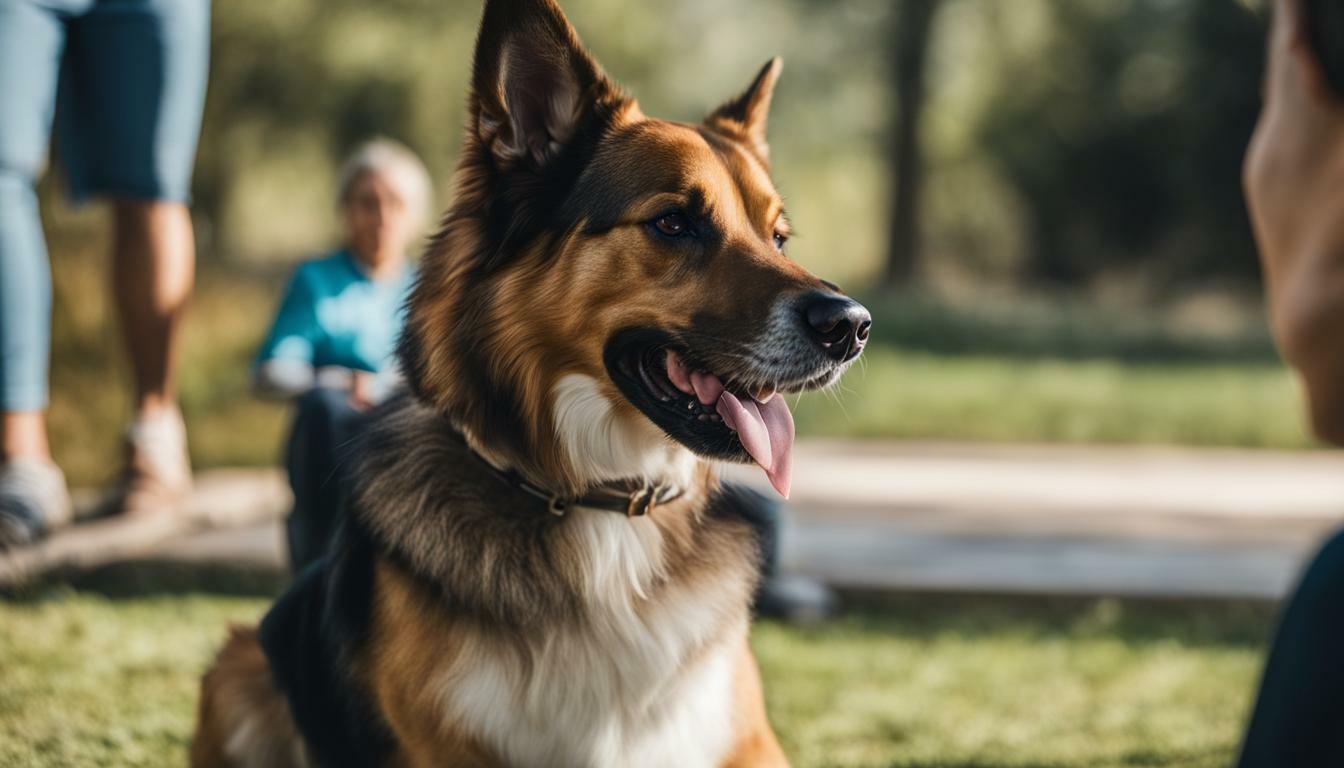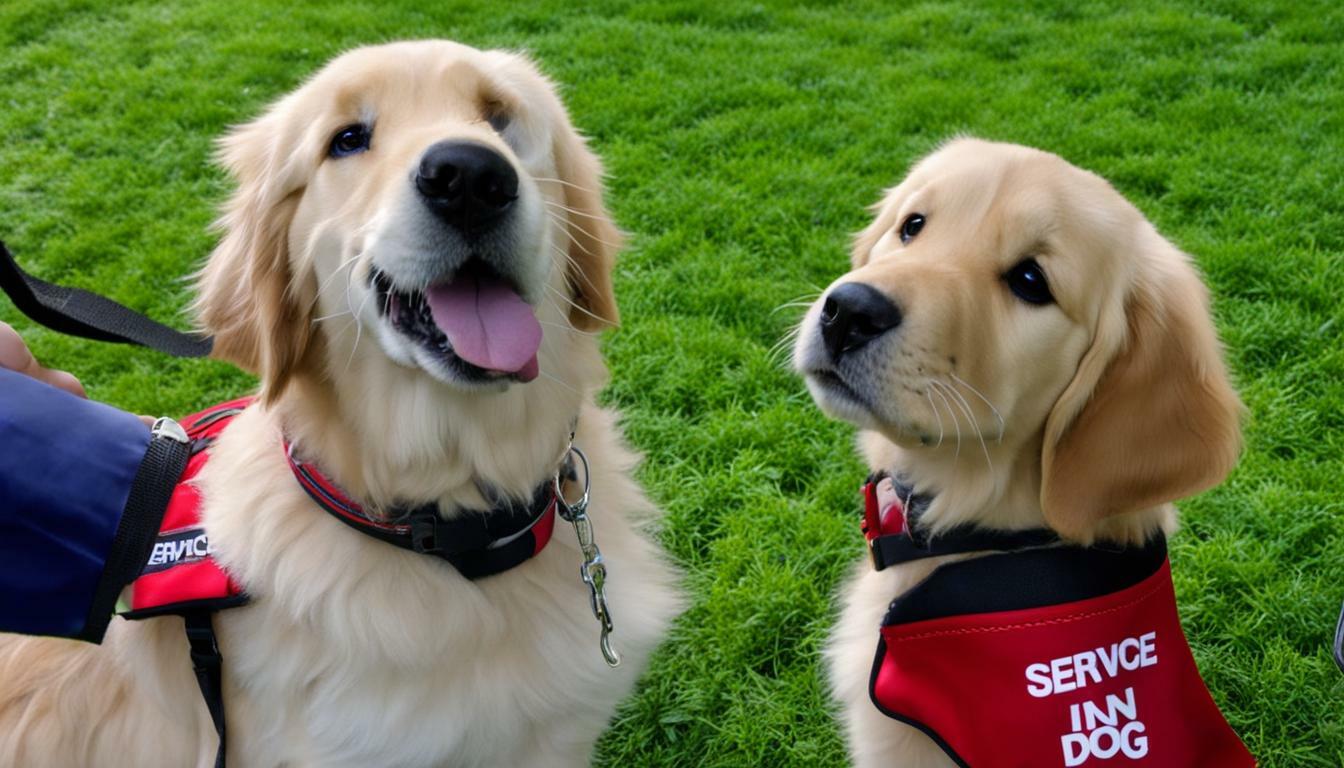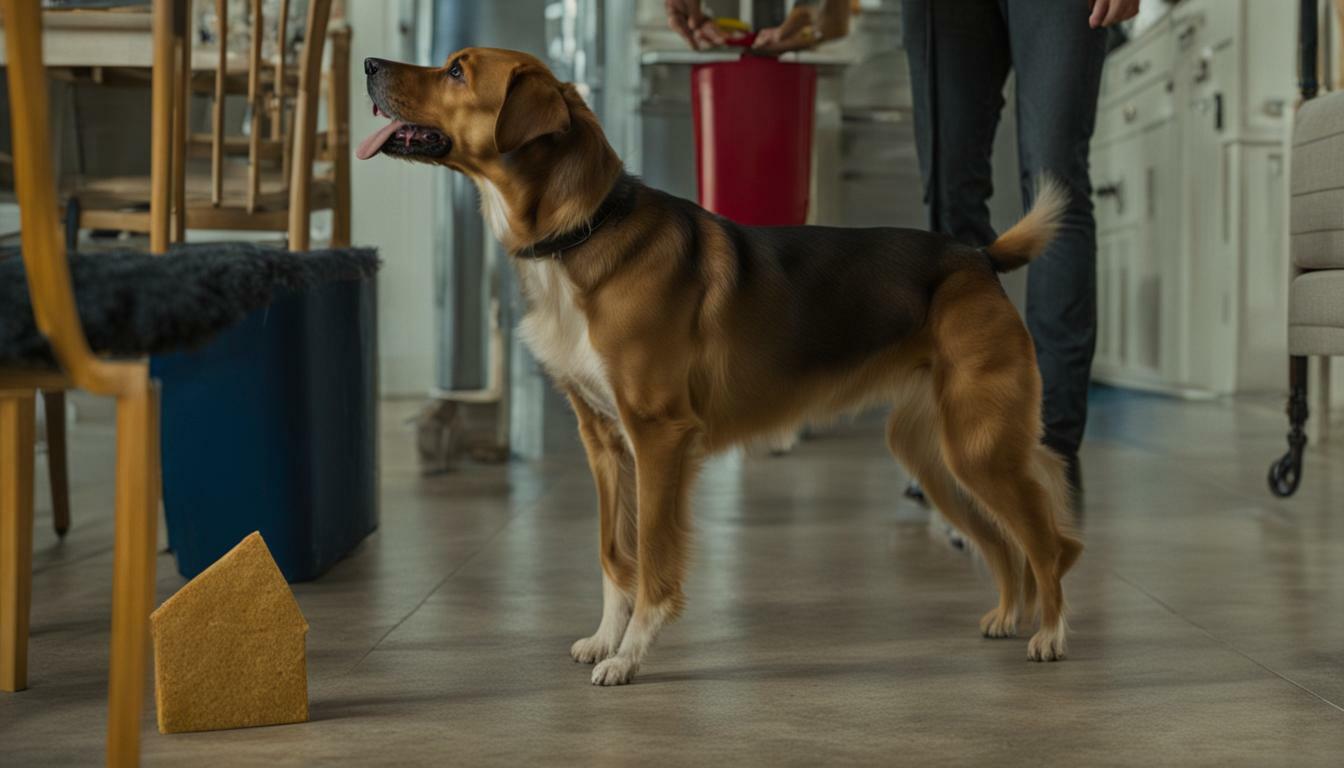As a dog owner, you may have wondered whether it’s too late to train your furry companion. The truth is that it’s never too late to start training your dog, no matter their age. In fact, training older dogs can be just as effective as training puppies, with the added benefit of their maturity and life experience.
Whether you’ve recently adopted an older dog or simply never got around to training your adult dog, there are plenty of ways to help your furry friend learn new behaviors and follow commands.
- Training dogs at any age is possible and beneficial for their overall well-being and development.
- Older dogs have different learning abilities and require modifications to training techniques.
- Patience, persistence, and consistency are crucial in effective dog training at any age.
- Professional help may be beneficial for addressing specific challenges in training senior dogs.
- The bond between trainer and older dog can be a unique and rewarding experience.
The Importance of Training Dogs at Any Age
Many people believe that once a dog reaches a certain age, it is no longer possible to train them. However, this is far from the truth. Dogs of all ages, including senior dogs, are capable of learning and adapting to new behaviors and commands. In fact, training an older dog can be just as effective and rewarding as training a puppy.
So, can you train an older dog? Absolutely. Starting dog training later in life is not only possible, but also important for a dog’s overall well-being and development. Training provides mental stimulation and helps prevent boredom, which can lead to destructive behavior. It also strengthens the bond between owner and dog and increases a dog’s sense of confidence.
There are several myths surrounding the age limitations for effective training, but they are just that, myths. With the right approach and techniques, training an older dog can be just as successful as training a younger one. Patience, consistency and positive reinforcement are key components of effective training for older dogs.
To ensure that your older dog gets the most out of their training experience, it is important to tailor your training methods to suit their needs. Older dogs may have physical limitations or health issues that require modifications in approach. Additionally, senior dogs may have a wealth of experience and knowledge that can be built upon in training.
Overall, starting dog training later in life is an excellent way to enhance the relationship between dog and owner and promote better behavior and well-being. So, if you have an older dog, don’t hesitate to start training today!
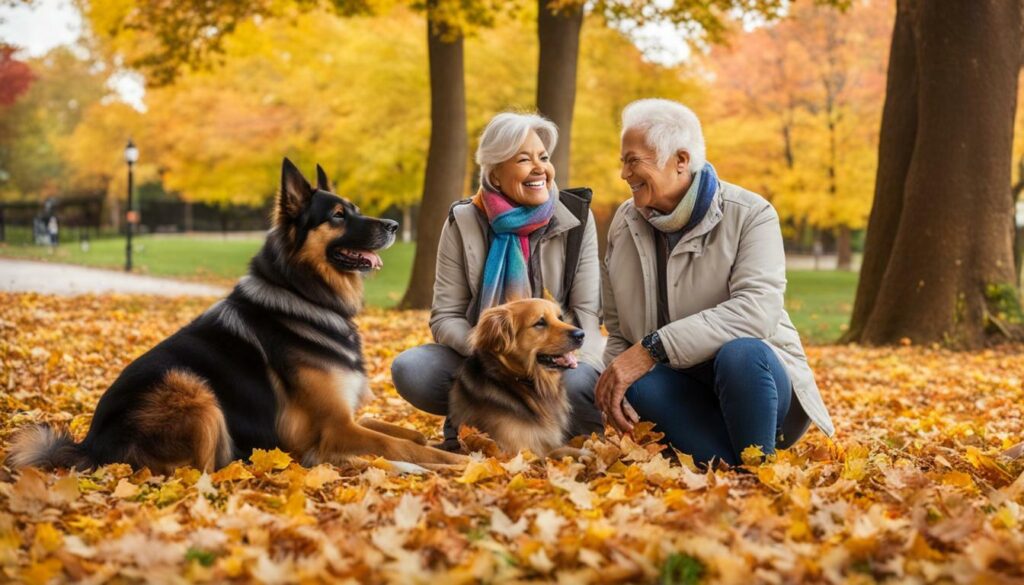
Training senior dogs requires a different approach than training puppies or young dogs. As dogs age, their physical abilities and cognitive functions decline, which can affect their ability to learn new behaviors. However, this does not mean that older dogs cannot learn new tricks or behaviors. With patience, persistence, and the right training techniques, senior dogs can still be trained effectively.
One important factor to consider when training senior dogs is their individual learning abilities. Each dog is unique and may require a different approach to training. Some dogs may learn new behaviors quickly, while others may need more time and repetition. Understanding your dog’s learning style and abilities is crucial in tailoring your training methods and setting realistic goals for your training sessions.
It is also important to keep in mind any physical limitations your older dog may have. For example, if your dog has arthritis or other mobility issues, certain training exercises and activities may need to be modified or avoided altogether to prevent pain or discomfort. Always consult with your veterinarian before beginning any training program to ensure your senior dog is healthy enough to participate.
Teaching an old dog new tricks may require more time and effort, but it can also be incredibly rewarding. Older dogs have already developed strong bonds with their owners and are often eager to please, making them highly motivated to learn new behaviors. By using positive reinforcement techniques and taking the time to build a trusting relationship with your senior dog, you can successfully train them to follow new commands and behaviors.
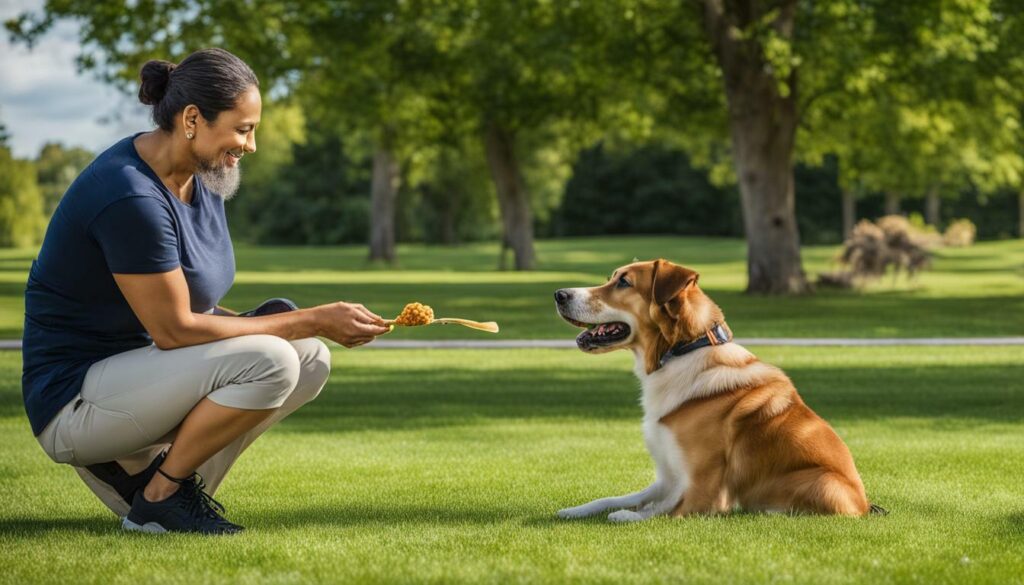
Overall, training senior dogs requires a patient and individualized approach. By understanding your dog’s unique learning abilities and physical limitations, you can tailor your training methods to meet their specific needs. With persistence, consistency, and positive reinforcement, you can successfully teach an old dog new tricks and strengthen your bond with your beloved companion.
Effective Training Techniques for Adult Dogs
When it comes to training adult dogs, it’s important to be patient, consistent, and adaptable. Older dogs may have learned certain behaviors that need to be unlearned, or they may have physical limitations that require modified training techniques. Regardless of age, all dogs can benefit from obedience training and positive reinforcement.
One effective training technique for adult dogs is clicker training. This technique uses a clicker to signify when a dog has performed a desired behavior, followed by a reward such as a treat or praise. This method can be particularly effective for older dogs who may not respond to verbal commands as readily.
Another important aspect of training adult dogs is to identify their individual learning style. Some dogs may respond better to visual cues, while others may be more responsive to verbal commands. By understanding your dog’s learning style, you can tailor your training approach to be more effective.
It’s also important to keep training sessions short and frequent. Older dogs may tire more easily, so breaking up training into shorter sessions throughout the day can be more manageable for them. Additionally, incorporating training into everyday activities such as meal times or walks can help reinforce obedience training in a natural and positive way.
Finally, it’s important to adapt training techniques to suit the specific needs and abilities of older dogs. For example, dogs with mobility issues may need modified exercises or additional support during training. By being flexible and patient, you can help your adult dog learn new skills and behaviors that will enhance their overall quality of life.
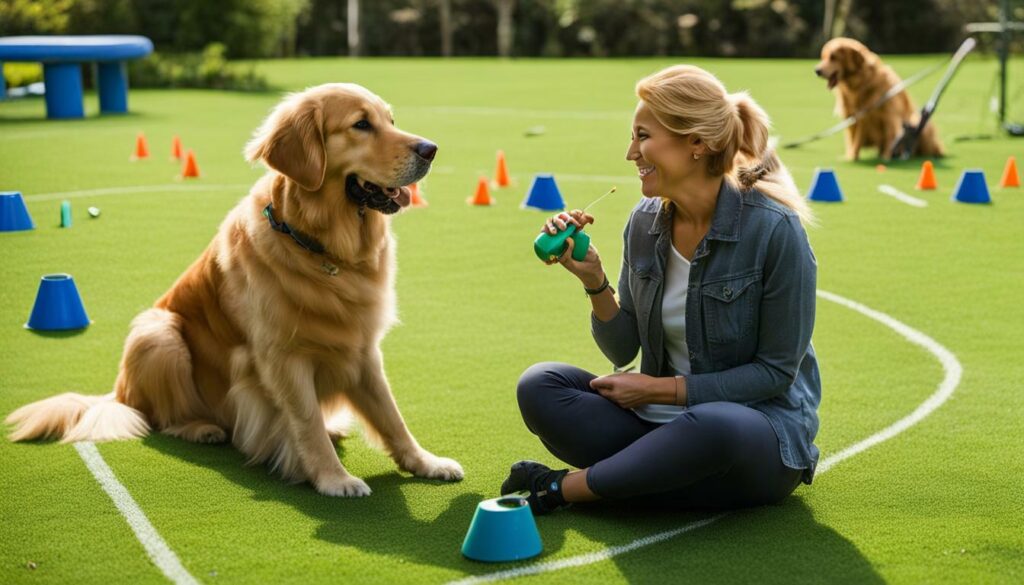
Establishing a positive training environment is crucial for effective dog obedience training for all ages. Dogs, like humans, thrive in nurturing and supportive surroundings, which encourages their ability to learn and respond positively to training.
One way to create a positive training environment is to avoid yelling at or punishing dogs when they make mistakes. Instead, using positive reinforcement techniques such as treats, praise, and playtime can motivate dogs to learn and behave well. This approach helps to build trust and confidence between the trainer and the dog, which is essential for successful training.
Another important aspect of creating a positive training environment is to ensure that the training sessions are short and frequent. Dogs have a limited attention span, and lengthy sessions can cause them to become bored and uninterested. Short, frequent sessions, on the other hand, keep dogs engaged and eager to learn.
Finally, it’s essential to make the training environment comfortable for dogs. Providing comfortable bedding, proper hydration, and adequate temperature control are all necessary for keeping dogs relaxed and focused during training.
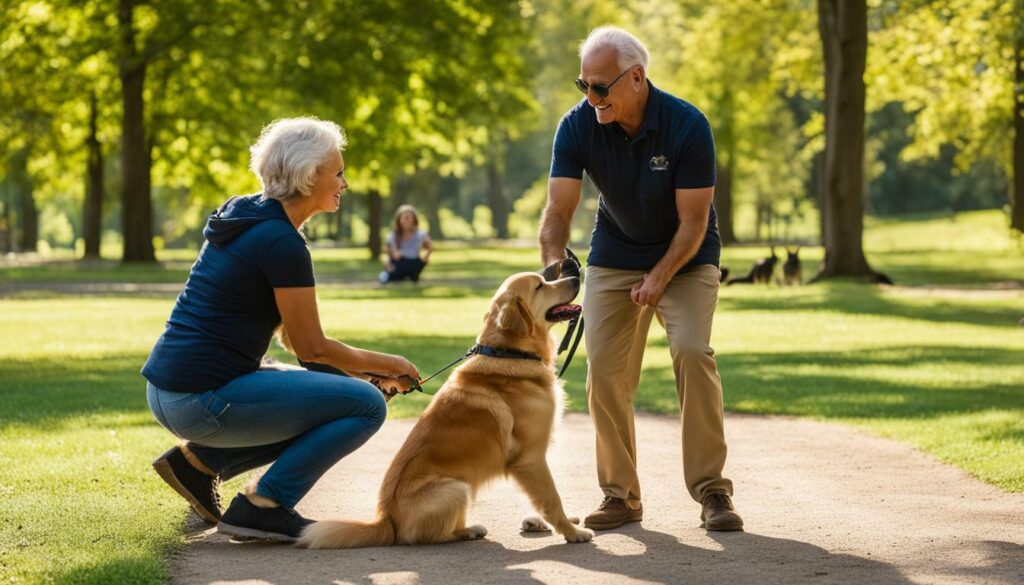
| Tip | Description |
|---|---|
| Use Positive Reinforcement | Avoid punishment and focus on positive reinforcement techniques, such as treats and praise. |
| Keep Sessions Short and Frequent | Dogs have a short attention span, so keep training sessions short and frequent to maintain engagement and interest. |
| Ensure Comfortable Surroundings | Provide comfortable bedding, proper hydration, and adequate temperature control to help keep dogs relaxed and focused during training. |
Setting Realistic Training Goals
When training dogs at any age, it’s important to set realistic goals that take into account the dog’s age, abilities, and previous training experience. Whether you’re working with a puppy or a senior dog, setting achievable goals is key to ensuring successful training outcomes.
Understanding Your Dog’s Capabilities
Before setting training goals, it’s important to understand your dog’s capabilities and limitations. Dogs of different ages and breeds have varying learning abilities, and it’s important to tailor training methods to suit their individual needs. For older dogs, it’s crucial to take into consideration any physical limitations or health issues that may affect their ability to learn and respond to commands.
When setting training goals, it’s important to start with basic commands and gradually increase the level of difficulty as your dog becomes more proficient. This helps to build confidence and prevent frustration for both you and your dog.
Measuring Progress
To ensure that your training goals are realistic, it’s important to regularly assess your dog’s progress. This may involve monitoring their response to commands, tracking the amount of time it takes for them to learn new skills, or seeking feedback from a professional trainer.
It’s also important to remain flexible and adjust your training goals as needed based on your dog’s progress. Every dog learns at their own pace, and it’s important to be patient and understanding throughout the training process.
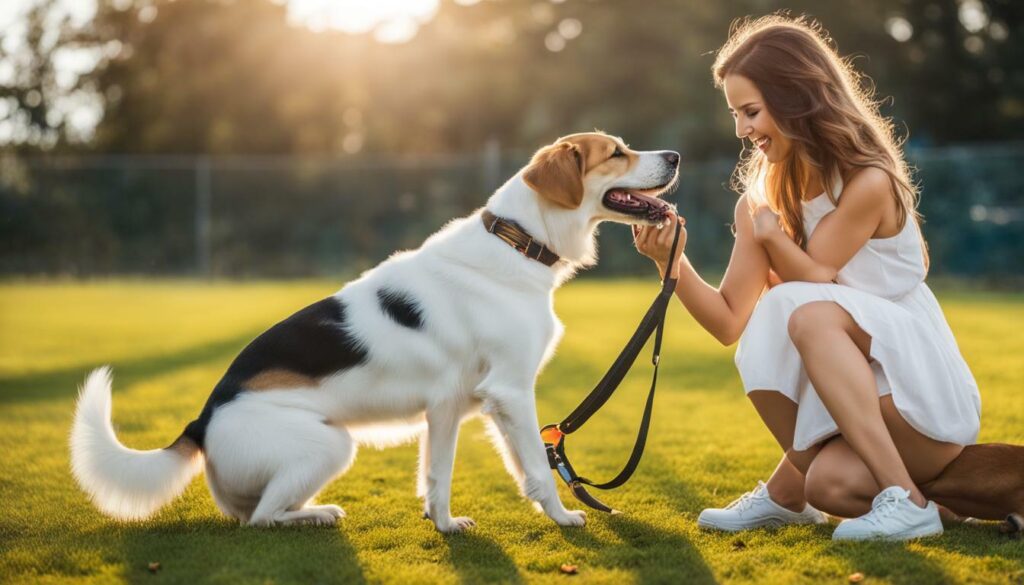
The Benefits of Setting Realistic Goals
By setting realistic training goals, you can help ensure that your dog experiences success and builds confidence throughout the training process. This can have a positive impact on their overall mood and behavior, as well as strengthen the bond between you and your dog.
It’s also important to remember that training goals should be focused on improving your dog’s behavior and quality of life, rather than simply achieving a certain level of obedience. By working towards these goals at your dog’s own pace and with patience and consistency, you can help your furry friend become a happy and well-behaved companion.
The Role of Consistency in Dog Training
Consistency is key when it comes to dog training, no matter the age of the dog. This is especially true when training an older dog, as they may have established habits and behaviors that require more consistent training to change. When dogs receive consistent training, they are more likely to learn and retain new commands and behaviors.
Consistency in training includes using the same commands and signals for each behavior, reinforcing positive behaviors with rewards, and correcting unwanted behaviors consistently. This means that everyone in the household should use the same commands and signals to ensure the dog understands what is expected of them.
It’s important to establish a consistent training routine as well. This means setting aside dedicated training time each day and sticking to it. Training sessions should be short and focused, with specific goals in mind. Breaking down training into small steps and focusing on one behavior at a time can help both the dog and trainer stay focused and motivated.
Consistency also extends to the use of positive reinforcement. Reinforcing positive behaviors with rewards such as treats, praise, or toys can be a powerful training tool. However, it’s important to be consistent in the use of rewards, ensuring that the dog only receives them for desirable behaviors.
Overall, consistency is essential in dog training at any age, but it can be particularly important when working with older dogs. By establishing a consistent routine and using positive reinforcement consistently, trainers can help older dogs learn new behaviors and commands with greater success.
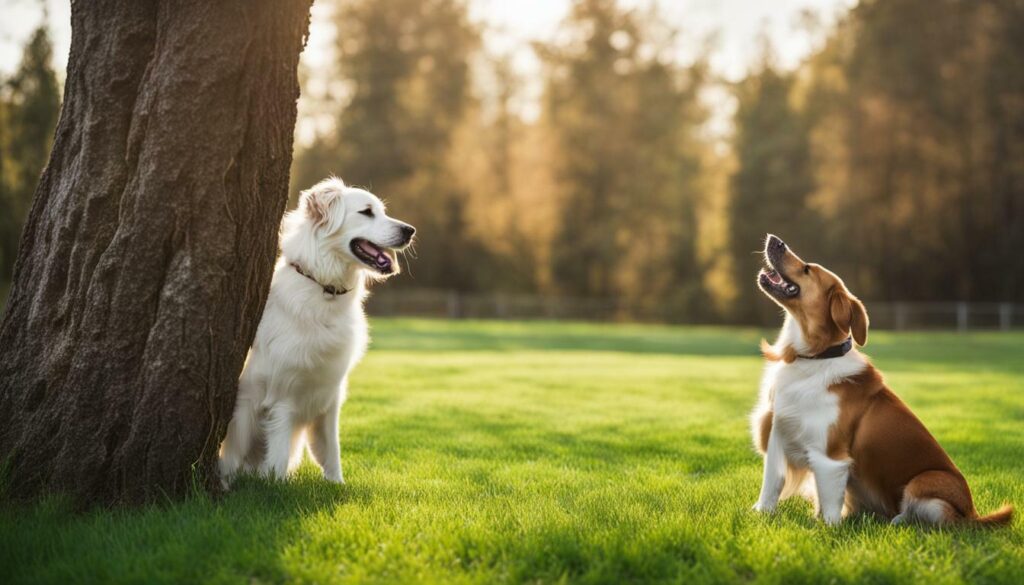
If you have an adult dog, you may be wondering if it is possible to train them effectively. The good news is that with patience and persistence, adult dogs can learn new behaviors and commands. In fact, many adult dogs can even learn faster than younger dogs because they have a better attention span and are more focused. So, can you train an older dog? Absolutely!
Starting dog training later in life may require some adjustment of training techniques to suit the specific needs of adult dogs. One effective technique is to use positive reinforcement, rewarding your dog for good behavior and ignoring bad behavior. Rewards can include treats, toys, and praise. However, it’s essential to be consistent in using rewards and avoid punishment or negative reinforcement.
Another crucial aspect of effective training for older dogs is to keep training sessions short and consistent. Adult dogs have shorter attention spans than puppies, so it’s essential to avoid overwhelming them with lengthy training sessions. Instead, aim for several shorter sessions throughout the day, focusing on one behavior or command at a time.
When training adult dogs, it’s also important to be patient and persistent. Dogs learn at their own pace, and some may take longer than others to learn new behaviors and commands. By remaining consistent and patient, you can help your dog achieve success while building a strong bond with them.
Overall, effective training for older dogs involves a combination of patience, consistency, and positive reinforcement. With these techniques, you can successfully train your adult dog and even teach them new tricks!
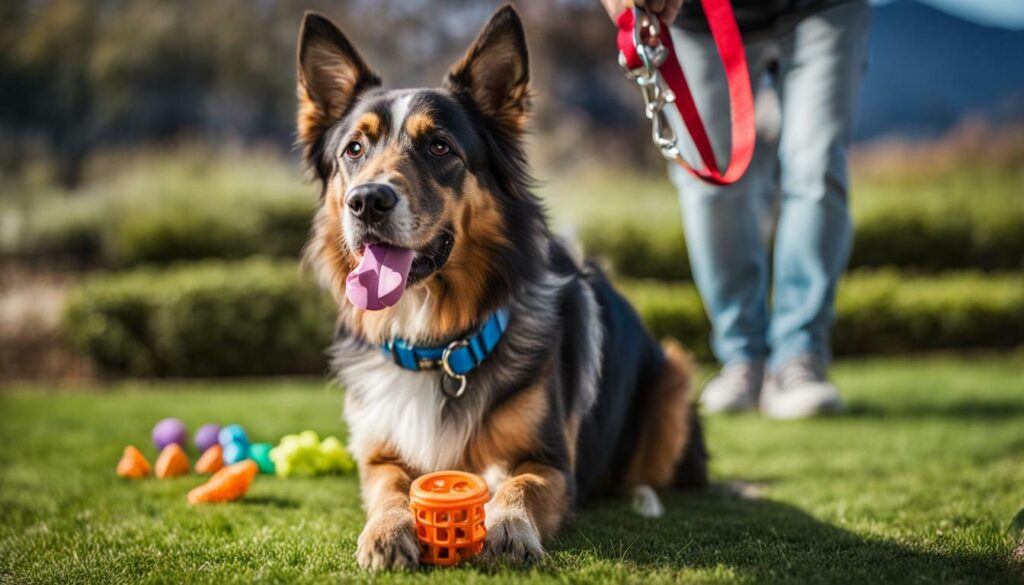
Socialization is an essential aspect of dog training for dogs of all ages, including senior dogs. The goal of socialization is to expose your dog to various people, animals, and environments, which can positively impact their behavior and overall well-being.
For adult dogs, socialization can help prevent or correct behavioral issues such as anxiety, aggression, and fear. By exposing your adult dog to different situations, you can help them become more confident and comfortable in new environments.
Socialization for senior dogs may be more challenging due to physical limitations or health issues, but it is still important to expose them to new experiences as much as possible. This can include short walks in different areas, meeting new people, or introducing them to other dogs.
When socializing your adult or senior dog, it is important to do so in a controlled and positive environment. Always supervise interactions with other dogs or people, and reward positive behavior with treats and praise. It may also be helpful to consult with a professional dog trainer for guidance on proper socialization techniques for your adult or senior dog.
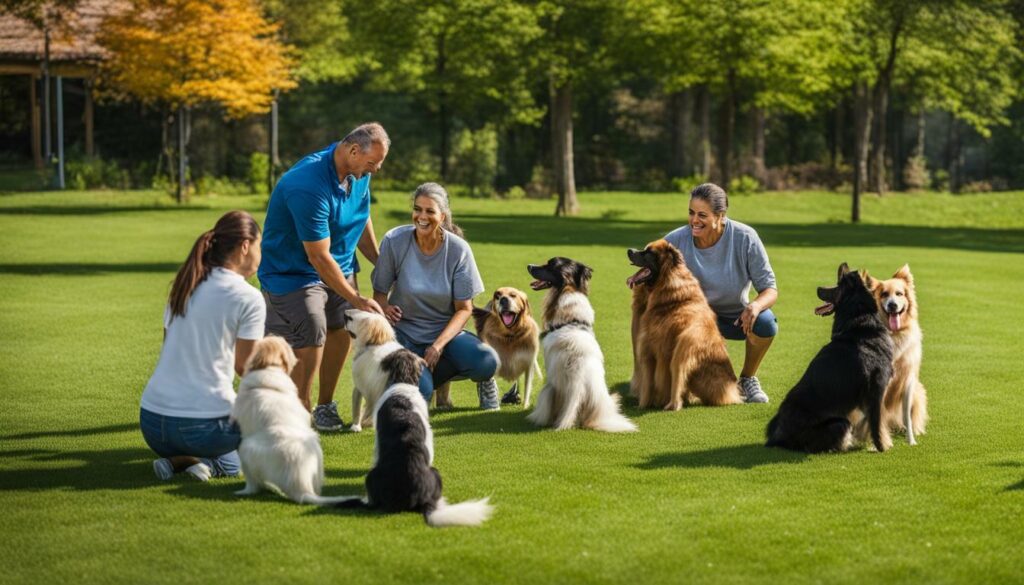
Effective training for older dogs requires a different approach than with puppies. While puppies may respond well to treats and praise, older dogs often need more encouragement and patience. Positive reinforcement is a valuable technique that can help motivate older dogs and encourage them to learn new behaviors.
When training an older dog, it’s essential to reward positive behaviors consistently. This positive feedback can be in the form of treats, praise, or affection, and it reinforces good behavior and encourages the dog to repeat the action.
It’s important to note that treats should be used sparingly and never as a bribe. Instead, treats should be given as a reward after the dog has completed the desired behavior. This reinforces the action and encourages the dog to continue to behave correctly.
Positive reinforcement can also be used to redirect negative behaviors. For example, if an older dog is chewing on furniture, redirect their attention to a chew toy and reward them for chewing on the appropriate object. This encourages the dog to associate positive behavior with positive rewards.
Using positive reinforcement can take time, patience, and consistency, but it’s a powerful tool for training older dogs. When combined with other effective training techniques, such as consistency and persistence, positive reinforcement can help older dogs learn new behaviors and become well-trained companions for years to come.
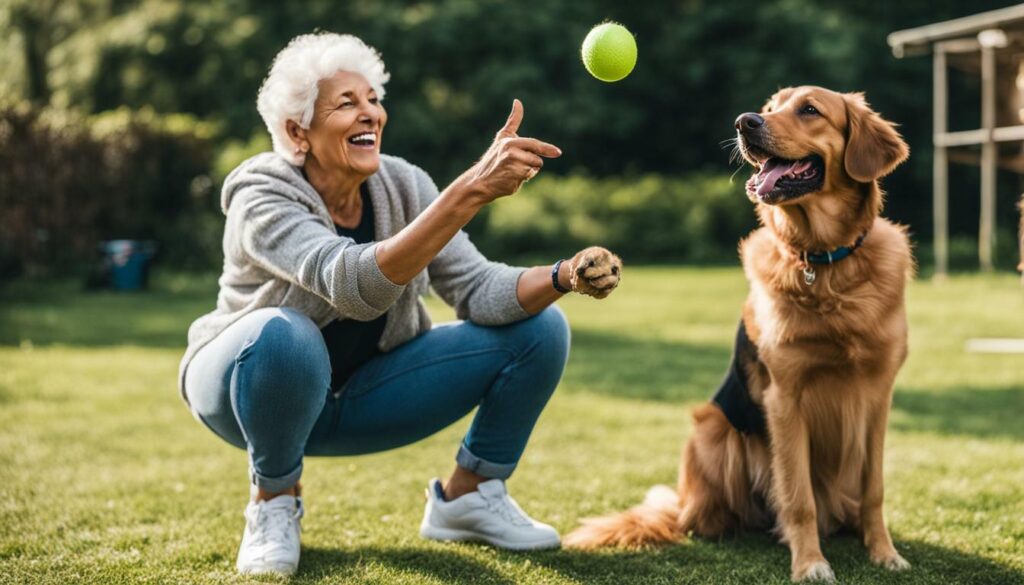
Training a dog of any age can be a challenging process, but it’s important to remember that patience and persistence are key to successful dog training. It’s important to approach training with a calm and determined mindset, as dogs can pick up on our emotions and react accordingly. Consistency is also crucial, as dogs need repetition to learn and form habits.
When training an older dog, it’s important to take things at their pace. Older dogs may not be as quick to learn as younger dogs, and may also have physical limitations that need to be taken into account. This is where adapting training methods to suit their specific needs and abilities comes in.
It’s also important to maintain a positive attitude and celebrate small victories along the way. Dogs respond well to positive reinforcement, and rewarding good behavior can encourage them to repeat it in the future.
Remember that every dog is different and may require a different approach to training. Stay patient, persistent, and adaptable, and you’ll be able to successfully train dogs of all ages.
Whether you’re starting with a puppy or an older dog, dog obedience training is important at any age. It helps to establish a healthy and happy relationship between you and your furry friend. Keep in mind that dog training at any age is possible, as long as you have the right approach and mindset.
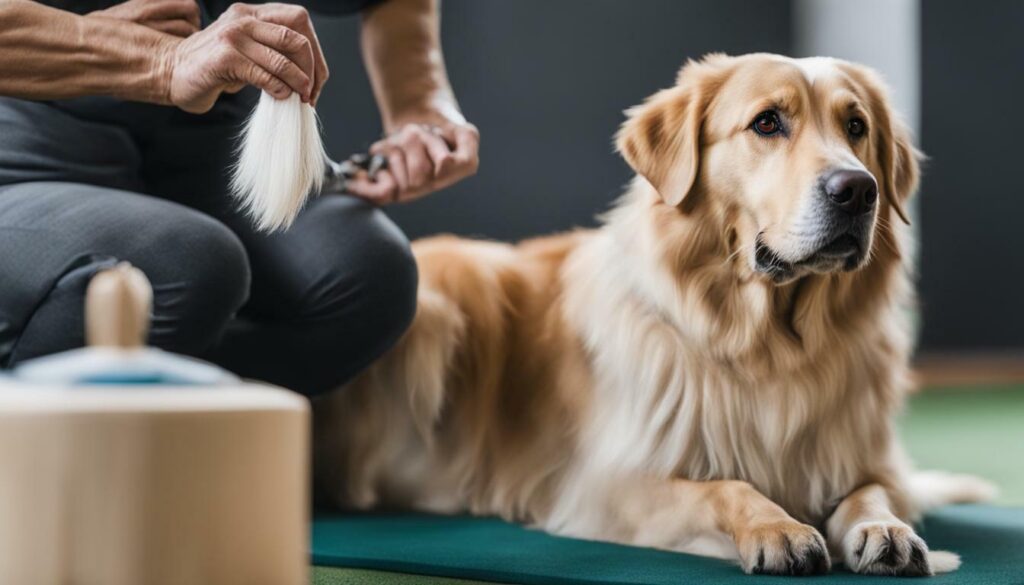
If you are struggling with training your senior dog or have specific challenges that require professional assistance, it may be the right time to seek professional help. Experienced trainers can provide tailored training programs and techniques that address your dog’s individual needs and personality.
When choosing a trainer, ensure they have experience in training adult dogs and senior dogs. Ask for references, and read reviews to ensure that the trainer is reputable and has a track record of success.
Professional trainers can also offer guidance and support on behavioral issues, including aggression, anxiety, and separation anxiety. With the right training techniques and expertise, even the most challenging behavioral issues can be addressed and corrected.
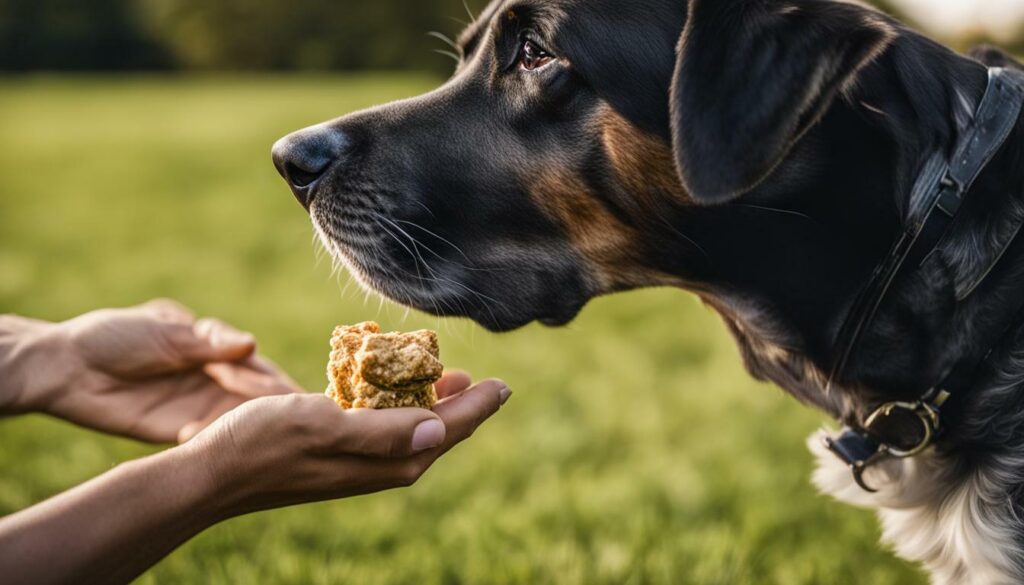
Training senior dogs can be a challenging yet rewarding experience. By seeking professional help, you can ensure your dog receives the best possible training and support, leading to stronger relationships and a more positive life experience for both you and your beloved companion.
Training Older Dogs for Specific Skills
One of the most common misconceptions about dog training is that it’s too late to teach an old dog new tricks. However, this couldn’t be further from the truth. With patience, persistence, and the right training techniques, dogs of any age can learn new skills and behaviors.
Some senior dog owners may be interested in training their dogs for specific tasks or activities. For example, agility training can help keep dogs physically fit and mentally stimulated, while therapy work can provide an opportunity for dogs to bring joy and comfort to those in need.
Agility training involves teaching dogs to navigate obstacle courses that require them to jump over hurdles, weave through cones, and navigate through tunnels. This type of training can be especially beneficial for older dogs, as it helps to improve their balance, coordination, and flexibility. Additionally, it can help to keep their minds engaged and prevent boredom.
Therapy work involves training dogs to interact with people in hospitals, nursing homes, and other types of care facilities. Dogs learn how to be calm, gentle, and comforting to those who may be experiencing physical or emotional distress. This type of training can be especially rewarding for senior dogs, as they are often well-suited for the role of therapy animals due to their calm and gentle demeanor.
If you’re interested in training your senior dog for a specific skill or activity, it’s important to work with a professional trainer who has experience in that area. They can provide valuable guidance and support, and help you to develop a training plan that’s tailored to your dog’s individual needs and abilities.

Remember, no matter what type of training you choose, it’s important to be patient and persistent. Dogs of any age can learn new skills and behaviors, but it takes time, effort, and a lot of positive reinforcement to achieve success. With the right approach and a little bit of hard work, you can help your senior dog learn new tricks and enjoy a happy and fulfilling life.
The Bond Between Trainer and Older Dog
The bond between a trainer and an older dog can be incredibly strong. Through training, a trainer can earn the trust and respect of an older dog, creating a deep connection that can last a lifetime. This bond is based on a foundation of mutual respect, communication, and patience.
When starting dog training later in life, it’s important to approach the process with an open mind and a willingness to learn from your dog. Older dogs may have years of experience and wisdom that can be harnessed during training. By taking the time to listen and understand your dog’s needs, you can build a strong and meaningful relationship based on trust and respect.
Teaching an old dog new tricks can be a rewarding experience for both the trainer and the dog. With the right training techniques and approach, dogs of any age can learn new skills and behaviors. It’s important to be patient and persistent, while also maintaining a positive and nurturing training environment.
By building a strong bond with an older dog through training, you can enhance their overall well-being and create a deeper sense of companionship. With trust and communication as the foundation, the possibilities for training and growth are endless.
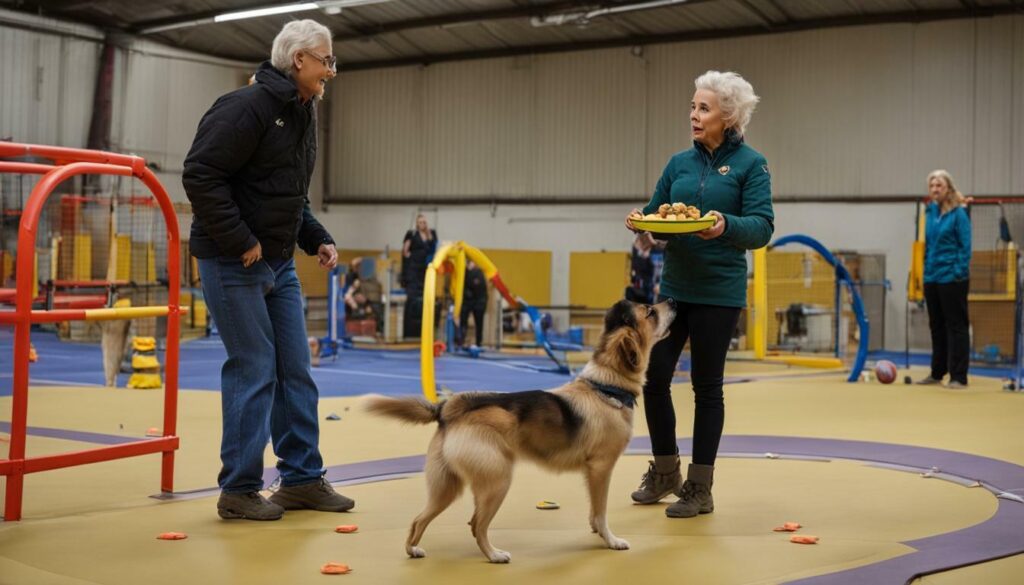
As we’ve discussed, training older dogs requires a specific approach and understanding of their individual needs. If you’re a senior dog owner looking to train your furry companion, here are some effective tips to keep in mind:
1. Adapt Your Training Methods
Older dogs may have physical limitations that require you to adapt your training methods. For example, if your dog has arthritis, it may be more difficult for them to perform certain exercises. Consider using alternative approaches, such as training on softer surfaces or using ramps.
2. Be Patient
Older dogs may take longer to learn new behaviors, so it’s important to be patient and avoid getting frustrated. Take breaks when necessary and adjust your training goals to align with your dog’s capabilities.
3. Keep Sessions Short and Frequent
Older dogs may tire more easily than their younger counterparts, so it’s important to keep training sessions short and frequent. Aim for several short sessions throughout the day and gradually increase the length as your dog’s stamina improves.
4. Use Positive Reinforcement
Positive reinforcement is an effective training technique for dogs of any age, but it’s especially important for older dogs who may be more sensitive to negative feedback. Use treats, praise, and other rewards to motivate and encourage your dog during training.
5. Ensure Physical Comfort
Older dogs may have specific physical needs, such as softer bedding or a warm environment. Ensure that your dog is comfortable during training sessions by providing a cozy and supportive environment.
By following these tips, you can effectively train your senior dog and build a strong bond with them in the process. Remember to be patient, adapt your approach, and use positive reinforcement to help your furry friend succeed.
FAQ
Is It Ever Too Late to Train a Dog? Revealing the Truth.
In this section, we will delve into the question of whether it is ever too late to train a dog. We’ll explore the truth behind this commonly asked question and provide expert insights on dog training at any age.
The Importance of Training Dogs at Any Age
Discover why training dogs at any age is crucial for their overall well-being and development. We’ll discuss the benefits of starting dog training later in life and debunk any myths surrounding the age limitations for effective training.
Understanding Older Dogs and Their Learning Abilities
Gain a deeper understanding of older dogs and their learning abilities. We’ll explore the challenges and rewards of training senior dogs and provide valuable tips on how to effectively teach an old dog new tricks.
Effective Training Techniques for Adult Dogs
Learn about the most effective training techniques for adult dogs. We’ll discuss how to modify training methods to suit the needs of older dogs and ensure successful obedience training for dogs of all ages.
Creating a Positive Training Environment
Discover the importance of creating a positive training environment for dogs of all ages. We’ll provide valuable tips on how to establish a nurturing and supportive atmosphere that encourages learning and obedience.
Setting Realistic Training Goals
Understand the significance of setting realistic training goals when training dogs at any age. We’ll discuss how to effectively gauge your dog’s capabilities and tailor your training objectives accordingly.
The Role of Consistency in Dog Training
Explore the crucial role of consistency in dog training. We’ll provide insights on maintaining a consistent training routine and the impact it has on a dog’s ability to learn and respond to commands.
Addressing Behavioral Issues in Older Dogs
Learn how to address common behavioral issues in older dogs through training. We’ll discuss specific techniques and exercises to help correct unwanted behaviors and foster positive changes in senior dogs.
Socialization for Adult Dogs
Understand the importance of socialization for adult dogs, including senior dogs. We’ll explore how proper socialization can positively impact behavior and enhance a dog’s overall confidence and well-being.
Rewards and Positive Reinforcement
Discover the power of rewards and positive reinforcement in training older dogs. We’ll discuss how to use treats, praise, and other rewards effectively to motivate and encourage desirable behaviors.
Patience and Persistence in Training
Learn about the importance of patience and persistence in dog training. We’ll provide strategies for maintaining a calm and determined approach while working with dogs of all ages.
Seeking Professional Help for Training Senior Dogs
Discover when and why it may be beneficial to seek professional help for training senior dogs. We’ll explore the advantages of working with experienced trainers to overcome specific challenges and ensure effective training.
Training Older Dogs for Specific Skills
Explore the possibilities of training older dogs for specific skills. We’ll discuss how dogs of any age can be trained for agility, therapy work, and other specialized tasks with the right training techniques and approach.
The Bond Between Trainer and Older Dog
Understand the unique bond that can form between a trainer and an older dog during training. We’ll highlight the importance of trust, communication, and patience in building a strong relationship with an older dog.
Training Tips for Senior Dog Owners
In this final section, we’ll provide practical training tips specifically tailored for senior dog owners. From adapting training methods to ensuring physical comfort, we’ll offer advice to help senior dog owners successfully train their beloved companions.
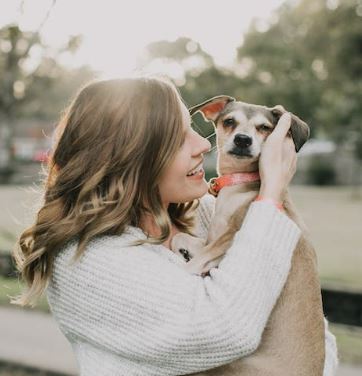
Marissa Delotta, 36, from Dayton, Ohio, is the creative force behind Roverboard.com, a beloved online destination for dog lovers. As a dedicated mom and canine enthusiast, Marissa combines her family experiences with her love for dogs to offer a platform where dog owners can exchange tips, heartwarming stories, and advice. Her website has become a vibrant community for sharing the joys of dog parenting. In her free time, Marissa enjoys exploring dog parks with her family and volunteering at local animal shelters.

